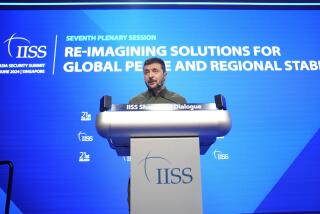U.S. Secretly Pushes China on Human Rights
WASHINGTON — The Clinton Administration has launched a secret, intensive diplomatic campaign to get China to make more concessions on human rights in the final weeks before the U.S. deadline for deciding whether Beijing’s trade privileges in this country should be renewed, officials say.
In effect, the Administration is now trying through secret negotiations to do what Secretary of State Warren Christopher was unable to do in Beijing last March--to make the Chinese regime take seriously President Clinton’s oft-repeated threats to curb China’s trade benefits if it fails to take concrete steps to ease its repressive policies.
In recent days, Administration officials have refused to confirm or deny reports that the President has dispatched a secret emissary to Beijing for talks with the Chinese government.
The Administration must decide by June 3 whether to renew China’s “most favored nation” trade benefits, which permit Chinese goods to be exported to the United States with the same low tariffs enjoyed by most other nations.
“We’re not going to have any comment on any diplomacy that is going on,” White House spokesman Tom Ross said Friday. Defending the secrecy, a senior Administration official said: “We’re in the delicate last stages of this thing, and there’s a fierce desire not to say anything.”
Two senior officials from the Jimmy Carter Administration, White House National Security Adviser Zbigniew Brzezinski and Michel Oksenberg, Brzezinski’s China expert on the National Security Council, are scheduled to land Monday in Beijing to take part in what is officially described as a conference.
Brzezinski and Oksenberg were in charge of the 1978 negotiations leading up to the establishment of diplomatic relations between Washington and Beijing.
In resorting to secret diplomacy with Beijing, the Administration is following essentially the same path taken by former President George Bush, whom Clinton criticized in the 1992 campaign for “coddling dictators” in China.
In the six months after China’s bloody 1989 crackdown, Bush twice dispatched Brent Scowcroft, his national security adviser, and Deputy Secretary of State Lawrence S. Eagleburger on secret missions to Beijing. Winston Lord, now Clinton’s assistant secretary of state for East Asia and the Pacific, then denounced Bush for sending “fawning emissaries” to China.
Under an executive order issued by Clinton a year ago, China was supposed to make “overall significant progress” on human rights by this June if it wanted to get its trade benefits renewed for another year.
This spring, human rights groups and several Administration officials have acknowledged that China has not yet made this progress.
Over the last few months, the Beijing regime has appeared to take several steps backward by rearresting dissidents who had been freed, such as leading democracy activist Wei Jingsheng. But early today, China’s official New China News Service said that prominent pro-democracy activist Chen Ziming has been freed, the Reuters news agency reported.
U.S. business groups worry that without new concessions from Beijing on human rights, the Administration will curb China’s trade benefits, and Beijing will then retaliate against U.S. companies.
The Administration’s immediate goal is to see if it can win enough changes from Beijing to be able to claim that there has been “significant progress.” Among the possibilities would be a series of releases of prominent dissidents, a promise to end the jamming of Voice of America broadcasts or some new agreement on talks with the Dalai Lama, the exiled Tibetan leader.
National Security Adviser Anthony Lake referred briefly to the new negotiations in a television interview Thursday when he acknowledged that after the Christopher trip, the Administration had decided to switch to quiet diplomacy with China.
“The way to work this through was to drain the venom out of that rhetoric (between China and the United States), which we have done over the last month or so, and to work it with them very hard and privately,” Lake said.
Lake met at the White House Thursday with Wang Juntao, a pro-democracy activist just released from prison in China. In that session, Lake indicated that the Administration has obtained some new concessions from the Beijing government on human rights. But he did not say exactly what China had promised or when it would be made public.
Douglas Paal, who served as director of Asian affairs for Bush’s National Security Council, said he had urged the appointment of a secret emissary to China a month ago but that Administration officials then were not receptive.
“I was asked for my ideas after the Christopher fiasco,” Paal said. “I suggested an emissary and I suggested some names, including Brzezinski and Oksenberg. I was told Clinton had ruled it out. But now they must be getting desperate.”
One congressional Democrat observed Friday that if the Administration has resorted to special emissaries and secret negotiations with China, it would amount to “a statement that the normal institutions of diplomacy aren’t working.”
During Christopher’s trip to Beijing last March, Chinese and U.S. officials called daily news conferences at which they issued angry denunciations of one another. Chinese officials accused the American visitors of trying to interfere in China’s domestic politics. At one point, Christopher told his Chinese host, Foreign Minister Qian Qichen, “I wish the talks were as good as the lunch.”
State Department officials contended this week that the secretary of state is still in charge of Administration negotiations with China. “We have had an intensive dialogue with China, following up on the presentation Secretary Christopher made in Beijing,” one Administration official said Friday.
In a carefully worded statement, a Chinese Foreign Ministry spokesman in Beijing told The Times on Friday that it had not been informed of any special emissaries sent to China by Clinton.
Times staff writers Rone Tempest in Beijing and Doyle McManus in Geneva contributed to this report.
More to Read
Sign up for Essential California
The most important California stories and recommendations in your inbox every morning.
You may occasionally receive promotional content from the Los Angeles Times.










